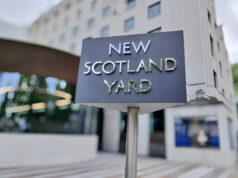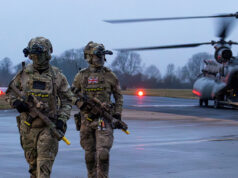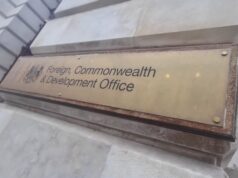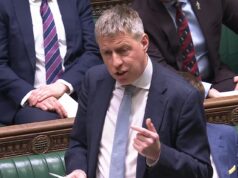The Defence Committee session with Defence Secretary John Healey highlighted discussions around recruitment challenges and potential solutions, including increasing flexibility for Commonwealth recruits and introducing fast-track processes for specialist roles.
Alex Baker raised concerns about the current 15% cap on Commonwealth recruits per cap badge, suggesting that the limit might hinder the UK’s ability to address recruitment shortages.
He pointed out that “with 36,000 Commonwealth soldiers in the pipeline, are we not missing a trick?”
John Healey responded by acknowledging the strong interest from Commonwealth applicants:
“Our level of recruitment of soldiers from the Commonwealth in particular is actually relatively high at the moment. It might be that many more want to apply than we can take, which is good, because it means that we get a selection of the best.”
While Healey recognised the value of their contribution, he emphasised the importance of addressing recruitment challenges across the board:
“Theoretically we could [increase the cap], but I have a concern about our recruitment across the board rather than one specific group.”
Baker also highlighted specific shortages in medical roles, including radiographers, dental nurses, and mental health nurses, suggesting a need for a fast-track process similar to the one recently introduced for cyber engineers.
Healey agreed, stating:
“The short answer is yes, undoubtedly. The opportunities are there not just for full-time recruitment but for reservist recruitment. That sort of hybrid can be attractive to many people, particularly if they have skills like that.”
He added that many full-time medical personnel in the Armed Forces also contribute to the NHS, demonstrating a fluid relationship between military and civilian roles:
“Many of those in the medical service who are full-time forces personnel work a lot of their time in the NHS and make a contribution to our NHS as well.”
At the UK Defence Journal, we aim to deliver accurate and timely news on defence matters. We rely on the support of readers like you to maintain our independence and high-quality journalism. Please consider making a one-off donation to help us continue our work. Click here to donate. Thank you for your support!













This is a repeat of NHS recruiting abroad for staff. Think UK workers should get the opportunity first even if they may need more support initially.
We don’t have enough people from Britain signing up at all, it isn’t a question of competing for places.
This seems a perfectly sensible idea and more Commonwealth cooperation seems a good thing in general with all of the China Belt and Road stuff going on.
There is something very wrong in the U.K. In 1800 we had a population of around 10m but the armed forces were still considerably larger than they are now with a population 7 times bigger. I don’t buy into the narrative that the entire younger generation are not interested and for me the fault lies clearly with the political establishment of the last 25 years.
You can delve into the details and look at outsourcing of recruitment, poor housing, low pay and the list is pretty long but virtually all these issues come back to our political leaders.
We are bankrupt in more ways than just financial and the change required will only come from an external shock because our political and media class are clearly incapable of bringing it about.
So in line with this modern British thinking why not entirely outsource our military and recruit from Eastern Europe, Asia and Africa.
So for employers and now the MOD it has always been easier to employ job ready people from abroad who are more willing and compliant. Obviously every uk person given a professional job opportunity and lifted out of poverty or given increased life chances is a massive win for uk society and economy. Currently approx 18% of working people are classed as in poverty. We can do better.
In the 1800’s most of the population could not read, now nearly half of all young adults go to tertiary education. That’s the massive difference. In addition until 1947 the majority of British service personnel were either paid for by the east India company or the British Raj and other colonial governments and their was a major chance of winning fame and fortune in the military.
It’s not really an apples to apples comparison.
We have also just come out of 20 years of pissing money and young lives up the wall on Middle East interventions only for the Americans to surrender at the last minute.
It’s really not surprising recruitment figures are lower.
There were plenty of people wanting to join the army in 2008 when we had massive unemployment and two wars to fight. Few people ever want to joint peace time military forces and even less when employment is high.
Young people want to join successful institution. Defense cuts, appalling headlines and defeat in Iraq are not helping. Same story with the nuclear sector: after 2 decades telling this is bad, no wonder nobody can find young engineers working on it.
Jim, when you treat your personnel like c@ap and make 20,000 redundant as we did in 2010 followed by further piecemeal reductions in numbers and conditions of service you get where we are now.
Until our Government increases numbers and investment in the armed forces young people quite rightly see the military as a poor career choice. That retention rates are poor tells you a lot about how many feel.
What do those currently serving in the RM’s and perhaps those contemplating joining think at the moment when your principal shipping capability has been scrapped to save a paltry £9m a year with no sign of replacement.
Actions do truly speak louder than words.
Forces News reports that fewer than 1 in 10 applicants end up joining British forces due flawed application process.
There are strong reasons not to recruit overly from the Commonwealth. Fundamentally Commonwealth citizens are still foreigners whose primary allegiance may or may not be to the United Kingdom (and the Commonwealth includes such friendly powers as Pakistan and South Africa). Some Commonwealth Applicants sure. But there’s a ceiling that shouldn’t be exceeded.
Whats up with recruiting these lazy illegal immigrants into the army, give them something to do instead of making a nuisance of themselves in city centres.
Ohhh shut up those u call lazy immigrants are willing to work than u are…
Sarcasm not your strong point?
Military service as a path to permanent residence and/or citizenship is an idea I could get on board with. I think this mostly already happens though.
Your a bloody idiot
The UK isn’t the only nation looking to foreign nationals to meet recruitment shortfalls.
English, Scottish and Canadian accents are already becoming more common across the ADF, joining the military after being granted permanent residency in Australia (normally after 4 years) or if currently serving in a foreign military directly transferring via the Overseas Lateral Recruitment Scheme (OLRS).
However since 1 June this year New Zealand citizens can now join the ADF after only 1 year living in Australia with US, British and Canadian citizens set to be eligible from 1 January next year.
I wonder which parts of the Commonwealth the UK is expecting to recruit from? I suspect the Australian lifestyle coupled with some serious investment by the ADF in new kit might attract more traffic our way. We’ll have to wait and see.
The USA has the greatest military on planet earth and they have allowed foreigners to join since 1863. They don’t even have a Commonwealth.
Jim, I did not realise that. Thought you had to be a US citizen. There must be some restrictions as to which nationalities they recruit?
When I was in the US Marines we had people from every part of the globe. US military service is a faster track to naturalization, though eligibility criteria per country, and individual circumstance are factors. I knew several Marines who still had Russian accents, but had been cleared through the INS. We had tons of people from various countries in Africa. I even had fellow officers who hailed from places like New Zealand and Colombia.
Three of my sisters joined the us marines and airforce
I left the ADF to join the Royal Marines 22 Years ago. The best decision I have ever made. The ADF unit I was in was very toxic and the private soldiers were treated very poorly. I spent 4 years in the ADF driving to exercises, rarely leaving Queensland. With the Royal Marines I have been to: Africa, Middle East, Asia, the Baltic and the Artic. However, you are right about the weather/lifestyle .
Logically, it is always going to be harder to recruit for a given number of posts from a population of 67 million than from a population in the billions. Commonwealth nationals have always been eligible to serve in the armed forces so the very existence of a cap on numbers baffles me.
Been saying this for year’s 🙄 .OT just watch intview on GBN with former boss of Mi6 he can’t believe Labour have made more defence cuts ,and believes it should be top of the list even above NHS although knows it’s unpopular. Well done for speaking up in my view .
Labour haven’t made defence cuts, they increased the defence budget by nearly £3 billion.
I suggest you don’t get your news from GBN if you wan to stay informed.
Defence had one of the biggest increases of any budget except health.
Labour has made cuts in some equipment that was largely lying idle, I don’t agree with these cuts however they did them primarily so they could give soldiers a wage increase in line with inflation.
I know a lot of commentators on here would prefer we spent everything on shiny new ships and tanks but I for one am glad to see service personnel finally start to get real wage increases after 14 years of cuts.
Indeed bad wages and conditions are likely to be one of the main reason that both the NHS and British Army are having to look abroad to recruit.
Wages need far more than an inflationary increase to get to the point that jobs in the UK military are attractive.
My view is that we ought to be spending at least 3% of GDP on defence which would allow real wage rises for the armed services and building sticks of ammunition which the war in Ukraine has shown to be far too small. Building numbers up so that formations are fully staffed can really only work after these two issues are fixed.
Give the RFA a 25% rise and the man power shortage will ease very quickly.
But they have added salary increases, Chagos islands leases and other things into the budget so additional funds were already spent. Hence why we have capability cuts. Really saving 500m over 5 years is nothing, 100m a year from a 40b+ budget and cutting amphibious capability just didn’t seem wise. Put it into perspective I believe the NHS costs 21m per hour.
Jim..I’m sorry but you’re at it again. The increase “announced” in the budget was not new money. It was agreed and part of the treasury forecast in May 2024 by the then Tory government. Labour have not increased defence spending. I have no great love for what the Tories did but so far Labour have done nothing other than make claims.
It’s not the lack of personnel applying, it’s the “Crapita” process that is the issue.
People excluded for childhood asthma, recruitment process taking months not weeks.
As a 16 year old, I visited the recruitment office in the March, went to Sutton Colfield in the Easter for “trade testing/ selection”, had my parents sign in the May to allow me to join and started as a apprentice in REME in the September after having done my O levels.
I was recently barred from joining the RAF Reserve from the Army Reserve after more than a dozen years there because of a childhood illness. Too many people turned away for minor reasons. (Although cutting the Reserves to those who either have skills or are prepared to approach Regular standards would save money. The Special Constabulary, in comparison, is arguably more dangerous and completely unpaid.)
This debate about raising the 15% ceiling per capbadge (which I had not heard about before) is second order.
More to the point, and I’m surprised Healey did not know this, is that MoD has imposed a closure of ‘the window’ for Commonwealth applicants and has done for a very long time – at least a year if not longer. I find that inexplicable as there is a recruiting ‘crisis’.
Applications from Commonwealth citizens are not currently being welcomed or processed according to the MoD website!
The problem is with a disjointed slow moving bureaucracy within the MoD Graham.
Change is ‘cripplingly’ slow.
It’s beyond bleeding obvious that we should tap into the large pool of potential recruits from our commonwealth!
We have always recruited from the Commonwealth, John. It is not a new thing. Johnson Beharry VC is from Granada. I served with people from Zimbabwe and Fiji.
What is strange is that now, for some unknown reason there is a temporary block on recruiting from the Commonwealth.
Is there not a steady stream of eligible young men making their way across the English channel who could form whole battalions!
People don’t tend to want to fight for you when you despise them and treat them like shit…
I would offer the opinion that 99.9% of the illegal invaders would rather join ISIS than the British Armed Forces.
Every man a soldier, every woman a nurse. ❤️☮️
Seems to work for The French Foreign Legion, may aswell give it a go.
A strategically stupid, illogical and reprehensible decision. However, nothing surprises me these days about UK plc. Why don’t we get some of those lazy so and so’s off benefits and in the army. It might reduce the benefits bill and also get them fit as well. Everything about this post-Blair country sickens me to the core.
The problem is with recruitment from abroad is being confident on even basic security checks. There’s plenty of countries even within
the commonwealth that you can pay to get you records cleansed, and if I’m sure countries link China will be happy to foot the bill in exchange for information. Yes theirs commonwealth countries where its harder to do this. But there countries outside the commonwealth also, my father fought along side many Polish pilots in WW2 as an example. And of course why not from the US one of our most trusted allies.
Here we go yet again. The MOD’s present reputation for hostility to the British Armed Forces traditional identity as actually British (by blood, not by pieces of paper) began when they spent thousands to replace historical paintings of past senior officers, and replaced them with modern, meaningless rubbish. What next, I wonder : quotas for minorities, until the entire organisation is unrecognisable ?
As many have said it’s not the problem of getting Brits to join it’s the recruitment process, my son has been waiting 1 year to join the navy and now he has given up, what makes it even worse he wanted to join at 16 but it took so long he went to do his a levels and now he has finished them he decided to travel instead.I am ex forces he took me six weeks to join and I never regretted a minute.
Increase the Nepalese British Army Gurkha Recruitment Numbers. Increase Gurkha Infantry. Engineer. Artillery etc Battalions & Officers. They want to join and are eager. Still have the selection test although at a less stringent entrance. Also give UK citizens joining the Armed forces the same incentives as US military better living standards. Free university places for children of all ranks. etc. etc. Just my thoughts on subject.
Uk Government and agencies are so disconnected, how about bring back national service , why would anyone go Uk to join mil and get bent over down the road on pension or can yih live in the uk after getting out , like the gurkas, also go uk over Australia or Canada ?? Not a hard choice
Subsidised uni for those serving X years. Allow those with medical conditions to join up on the basis they might be MLD for ever.
Maybe if the recruited white males, instead of concentrating on diversity targets, there wouldn’t be a recruitment crisis.
NO hope until the whole package is sorted out. Experience shows they come to get the benefits of gaining a British Passort in the end for many and others to gain income they send home to make their future lives better then leave. Not interesting in serving the Crown as we once did. UK Armed Forces are looked on as anything but tuff anymore (odd exceptions of course). In the 80’s and 90’s there was a waiting time to get in once accepted and the forces were so much larger and respected. Sorry not the case anymore as its all about meeting the liberial views of the few rather than the masses in recuiting (and the view we had was ‘The Best Person for the Job regardless of who or wher the came from’ not anymore.
I think we should wait to see the effects of the reforms to the recruitment process before lifting the cap on commonwealth recruits.
There is not a lack of people wanting to join – just a terrible recruitment system that filters out too many based on out-dated mdeical criteria, and takes so long that many of those that pass all the criteria give up on the process and start promising careers elsewhere.
If we can get the application to recruitment rate to increase even marginally from 10% to say 15% that would be more than sufficient in the short-term.
The other challenges in this area are retaining highly skilled personnell (who are also very expensive to train and replace), and shaping the reserves so that it’s a more attractice proposition for people, enabling them to expand.
The more pressing need is to end the temporary block on recruiting any Commonwealth citizens.
The more pressing need is to end the temporary block on recruiting any Commonwealth citizens.